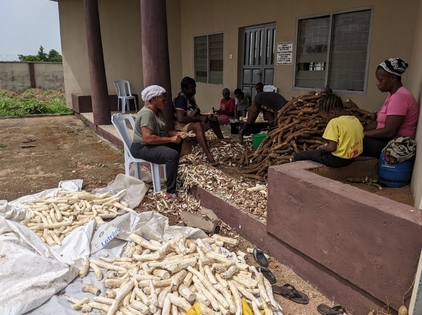
support@yorubalibrary.com
+2348073529208, 07038599574

Yoruba traditional food is a celebration of the rich agricultural heritage and culinary skills of the Yoruba people. From the farm to the table, the journey of Yoruba food is marked by sustainable farming practices, diverse ingredients, and intricate cooking methods. This article explores the process of bringing traditional Yoruba food from farm to table, highlighting key ingredients, preparation techniques, and cultural significance.
Sustainable Farming Practices
Yoruba farming practices are deeply rooted in sustainability and respect for the land. Traditional farming methods emphasize crop rotation, mixed farming, and organic fertilizers.
Crop Rotation and Mixed Farming
Technique: Farmers often practice crop rotation to maintain soil fertility. Mixed farming, which involves growing multiple crops together, is also common.
Example: A typical Yoruba farmer might grows yam, maize, cassava, and vegetables in the same field.
Significance: These practices help to preserve soil health, reduce pests and diseases, and ensure a diverse and nutritious food supply.
Key Ingredients in Yoruba Cuisine
The journey from farm to table begins with the cultivation of essential ingredients that form the backbone of Yoruba cuisine.
Yams (Isu)
Yams are a staple in Yoruba diets and are often referred to as the "king of crops" due to their importance.
Uses: Yams are used in various dishes such as pounded yam (iyan), yam porridge (asaro), and fried yam (isu din-din).
Cassava (Ege)
Cassava is another crucial crop, known for its versatility.
Uses: Cassava is processed into products like gari (fermented and roasted granules), fufu (fermented dough), and lafun (cassava flour).
Vegetables and Greens
Leafy greens like spinach (efo tete), pumpkin leaves (ugu), and waterleaf (gbure) are commonly used in Yoruba cooking.
Uses: These greens are essential ingredients in vegetable soups such as efo riro and ewedu.
Traditional Cooking Techniques
Yoruba cooking techniques have been refined over generations, emphasizing flavor and nutrition.
Grinding and Pounding
Technique: Traditional tools like the grinding stone (olo) and mortar and pestle (odo ati omo odo) are used to grind and pound ingredients.
Example: Peppers, tomatoes, and onions are ground into a paste for soups and stews, while yams are pounded to make iyan.
Significance: These techniques help to release and blend flavors, creating rich and aromatic dishes.
Steaming and Boiling
Technique: Steaming and boiling are common methods for preparing staples like rice, beans, and plantains.
Example: Moi moi (steamed bean pudding) and ekuru (steamed mashed beans) are traditional dishes prepared using these methods.
Significance: These methods preserve the nutritional value of ingredients while ensuring they are cooked thoroughly.
Frying and Roasting
Technique: Frying and roasting are used to enhance the texture and flavor of certain dishes.
Example: Akara (fried bean cakes) and boli (roasted plantains) are popular Yoruba snacks.
Significance: Frying and roasting add a crispy texture and deep flavor to the food, making it more enjoyable.
From Preparation to Serving
Once the food is prepared, the process of serving is equally significant, reflecting Yoruba hospitality and communal values.
Communal Eating
In Yoruba culture, meals are often shared communally, emphasizing togetherness and unity.
Example: Families gather around a large bowl of soup or stew, with each person using their hands to partake.
Significance: This practice fosters a sense of community and strengthens family bonds.
Presentation
Food presentation is also important, with an emphasis on aesthetics and appeal.
Example: Dishes are often garnished with colorful vegetables and arranged neatly on the plate.
Significance: Attractive presentation enhances the dining experience and shows respect for the food and those who will eat it.
Cultural Significance of Yoruba Food
Yoruba food is more than sustenance; it is an expression of culture, tradition, and identity.
Festivals and Celebrations
Traditional foods play a central role in Yoruba festivals and celebrations, symbolizing abundance and gratitude.
Example: During festivals like the New Yam Festival, special dishes are prepared to honor the gods and ancestors.
Rites of Passage
Food is also integral to rites of passage, such as weddings and naming ceremonies, marking significant life events.
Example: Special meals are prepared to celebrate these occasions, reinforcing cultural heritage and family ties.
Conclusion
The journey of Yoruba traditional food from farm to table is a testament to the rich agricultural practices, culinary expertise, and cultural values of the Yoruba people. From sustainable farming to intricate cooking techniques and communal dining, every step reflects a deep connection to the land and heritage. Embracing these traditions helps to preserve the cultural identity and ensures that the flavors and wisdom of Yoruba cuisine continue to thrive.

Learn about the Yoruba concept of Ìwà Pẹ̀lẹ́ (good…

Learn special praises for Divine Being and Creator…